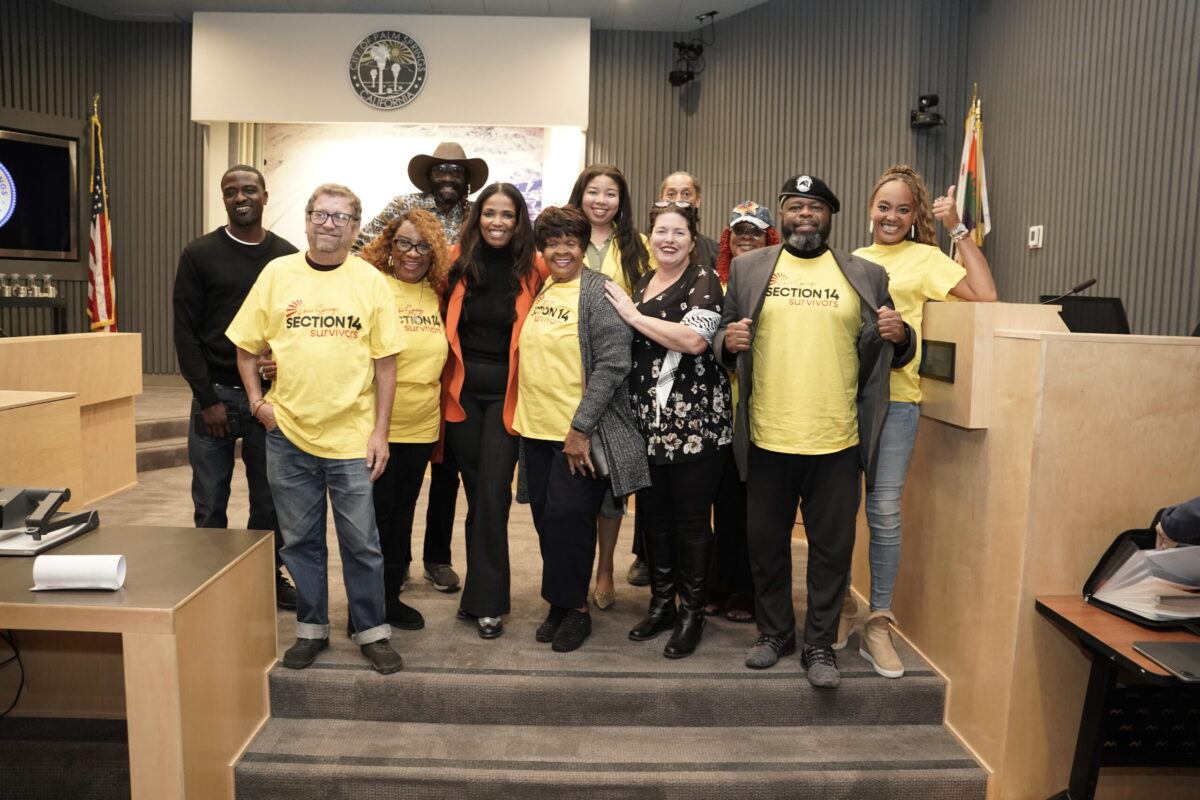By Marcos Palma/El Informador Del Valle
PALM SPRINGS, Calif. — The Palm Springs City Council chambers were packed Nov. 14 evening with people who were survivors and descendants of a cruel policy which forcibly evicted people of color from their homes in the 1950s and 60s.
The policy is known as Section 14, and refers to a square mile in the center of the city where Blacks, Latinos, and Native Americans were forbidden from buying or living in the homes they owned because of the racist laws of those times. Residents of that area did not have public services such as sewage treatment and drinking water.
These lands were owned by the Agua Caliente tribe formed by the Cahuilla Indians.
Tributes to Survivors
On a 5-0 vote Nov. 14, the City of Palm Springs agreed to $5.9 million dollars which would be distributed among the relatives of descendants or survivors who lived in 197 houses which were removed or destroyed. Among other issues within this agreement, $10 million dollars would be allocated for first-time home buyers, as well as another $10 million for an affordable housing fund.
Additionally, the city will analyze the following proposals: naming a park after Section 14; establishing a monument to honor the legacy of these residents; building a cultural center, and designating a day to remember the victims of these acts of discrimination.
Unanimous Vote
Palm Springs Mayor Jeffrey Bernstein said: “There is no way to correct the mistakes of the past. What we can do is to restore the wounds and move forward in search of justice that repairs the damage.”
Before casting its unanimous vote, the Council heard from more than 20 people who provided testimony in person or by phone. Many survivors and descendants could be identified by the yellow shirts they wore. No Latinos testified, though many were present.
Section 14 President Pearl Devers witnessed the dispossession of her home as a child. “My father was involved in alcoholism because he could not get a loan to buy another house. There are many stories that have not been told. I have cried a lot for the people who have shared their experiences with me.
“As we move forward with this agreement, I hope we can build a city that is united, where justice is for all,” said Devers.
Attorney Asks for $100 Million
David Vignola, representative of the Human Rights Commission of the City of Palm Springs said: “I agree that these people should receive monetary compensation. I think this could remedy the damage done to the residents of Section 14. Although all suffering can never be compensated, this action invites us to speak out. When someone is ignored, we all have the commitment to raise our voices,” he emphasized.
Section 14 survivors, represented by the lawyer Areva Martin, struggled for 2 years before the City Council came to an agreement. Martin initially requested compensation of $100 million, but survivors accepted $5.9 million.
The meeting was conducted in a very respectful manner. There were very few people who opposed the agreement to compensate the victims of section 14. “My parents lived in this community and I am asking you to make a positive decision and do what is right. It was a holocaust against my people,” said Shamaya Holland.
Compensation for Cultural Groups and Churches
“I am a descendant of section 14. My mother, my uncles, my cousins lived in that place,” said Stephanie Brown. “I ask the leaders to do the right thing. My relatives contributed to the growth and development of this city.”
”You can make a difference and change this image generated by the pain caused against the families of section 14,” said Brown.
Peter Crawford mentioned the presence of Mexicans in section 14. “My parents came to this city in the ‘60s. My grandmother lived in this area. There are many statements from her in different publications.”
Crawford said he had hoped for a larger compensation, but added: “It is what it is.” He also stated his belief that the compensation was not reparations, and that the non-profit organizations of those times have to be compensated, such as the Fiesta Mexicana, as well as those churches that were removed from the area.
’Wetback, Go Back to Mexico’
Delia, a Mexican American woman who at that time was 14 years old and lived with her parents, told this publication of the racism she and her family faced.
“They told us: ‘wetback, go to Mexico.’ One time some people shot me with rubber bullets in the leg. Since then I developed a kind of hatred,” she said.
“I am here to fight for my parents. They took our homes and language from us. At school, we weren’t allowed to speak Spanish and now my children don’t speak it either. It is time to fight for justice,” said Delia.




